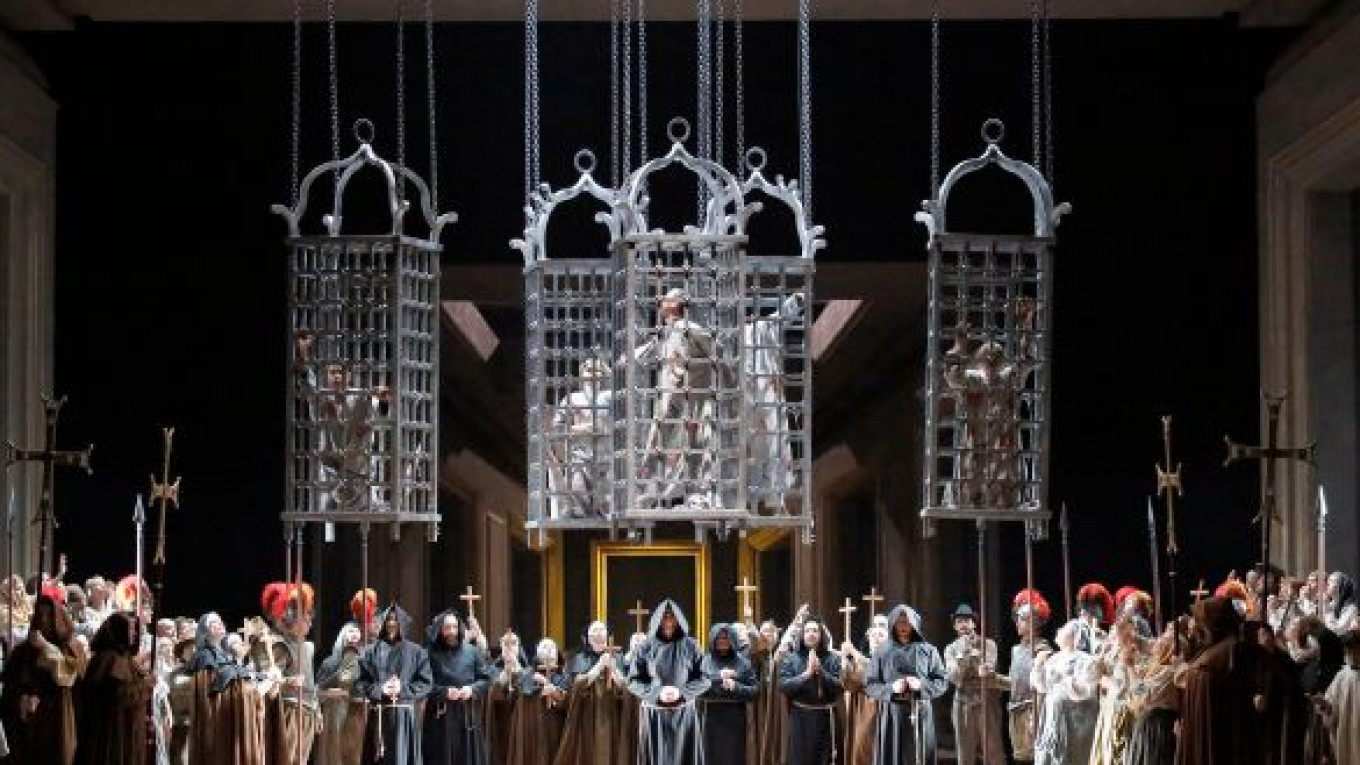In celebration of the 200th anniversary of Giuseppe Verdi's birth, the Bolshoi brought to its Main Stage in mid-December a new production of the composer's opera "Don Carlo."
Considering the complexities of "Don Carlo" and the abrupt departure from the theater, a mere two weeks before the opera's premiere, of its designated conductor, Vasily Sinaisky, the result was for the most part positive, with an abundance of excellent singing and a staging that nicely served to disentangle the threads of the opera's elaborate plot.
Based on the play "Don Karlos" by Friedrich Schiller, Verdi's "Don Carlo" concerns love, politics and religion at the court of Spanish King Phillip II during the early 1560s. Though rather short on historical accuracy, its story nevertheless inspired Verdi to write music of greater profundity than almost any to be found in his earlier operas.
The opera's love element is a quadrangular affair. Don Carlo is in love with Elizabeth de Valois, once his fianc??e and now the wife of his father, King Phillip, and is in turn pursued by Elizabeth's lady-in-waiting, the Princess Eboli. Spurned by Carlo, Eboli betrays him to the king, who is forced to confront the truth that Elizabeth has never loved him.
Politics in the opera involve the commitment of Carlo and his friend Rodrigo to the cause of freeing Flanders from oppressive Spanish rule, a commitment expressed in language more appropriate to the world of Schiller, who wrote his play on the eve of the French Revolution, than to Spain of the 16th century.
Religion concerns the Spanish Inquisition, as personified by the Grand Inquisitor, whose spiritual authority is powerful enough to persuade the king to execute his own son.
The Bolshoi's vast Main Stage absolutely cries out for stylish traditional productions of large-scale 19th-century operas. And that is precisely what British director Adrian Noble and his production team have come up with. Noble moves principals and chorus about in classic fashion, no doubt partly a reflection of his experience as a long-time head of Britain's Royal Shakespeare Company. Decor and costumes are the work of a pair of highly regarded German designers. The unit set of Tobias Hoheisel struck me as overly austere, but nevertheless served reasonably well as a background for the opera's seven scenes. By way of contrast, Moritz Junge came up with an array of stunningly beautiful costumes, obviously inspired by the apparel seen in paintings of Spain's golden age.
With the sudden defection of Sinaisky, the Bolshoi called upon the services of two young conductors, American Robert Trevino and Italian Giacomo Sagripanti, one for each of the production's two casts.? I missed the second cast, so can only comment on Trevino. Given the circumstances and Trevino's rather limited experience in conducting opera, he was able to do little more than hold things together. But that he did with a fair degree of success.
A cast for "Don Carlo" would ideally contain five of the world's finest Verdi interpreters. The Bolshoi's first cast contained none of those, but, with a single notable exception, gave a highly commendable account of the music.
Best of all were South Ossetian-born soprano Veronika Dzhioeva, as Elizabeth, and baritone Igor Golovatenko, borrowed from Novaya Opera, as Rodrigo. Both shone with particular brilliance in their respective arias toward the end of opera, Dzhioeva bringing true vocal splendor to Elizabeth's valedictory "Tu che le vanita," Golovatenko coming up with a beautifully sung, straightforward interpretation of Rodrigo's farewell to Carlo and death scene that happily avoided the maudlin sentimentality so often heard from even the most distinguished of baritones.
Italian tenor Andrea Care, one of the last pupils of Luciano Pavarotti, provided little vocal excitement in the title role, but displayed a sturdy voice and the welcome sound of authentic Italian diction.
Bass Dmitry Beloselsky, vocally and physically imposing, proved a near-perfect King Phillip. His only misstep was choosing, contrary to the instruction in Verdi's score, to begin the king's great lament "Ella giammai m'amo" at full voice, thereby stealing the drama from later passages in which the voice is directed to rise to a forte.
Making her Bolshoi debut in the pivotal role of Eboli was world-famous Ukrainian-born soprano Maria Guleghina. Unfortunately for her, Eboli was written for a mezzo-soprano, and Guleghina lacked the smooth, full-bodied low notes so important to the part. Yet even in her accustomed soprano range, there were many moments of uneven singing.
No further performances of "Don Carlo" appear on the Bolshoi's schedule as announced through April. But, as a truly notable addition to the theater's Italian repertoire, it will no doubt return sometime soon. Bringing it back in respectable form, however, will mean assembling a cast at least as good as the first one at the premiere, as well as employing a suitably experienced conductor.?
Contact the author at artsreporter@imedia.ru
… we have a small favor to ask. As you may have heard, The Moscow Times, an independent news source for over 30 years, has been unjustly branded as a "foreign agent" by the Russian government. This blatant attempt to silence our voice is a direct assault on the integrity of journalism and the values we hold dear.
We, the journalists of The Moscow Times, refuse to be silenced. Our commitment to providing accurate and unbiased reporting on Russia remains unshaken. But we need your help to continue our critical mission.
Your support, no matter how small, makes a world of difference. If you can, please support us monthly starting from just $2. It's quick to set up, and you can be confident that you're making a significant impact every month by supporting open, independent journalism. Thank you.
Remind me later.



